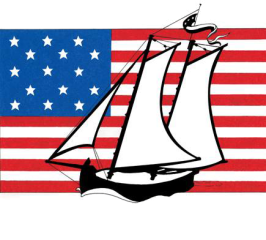A book-length history of the 1812 privateer is available on board
WAR
When war broke out in June of 1812, Salem was one of the busiest ports in the young United States. But for the last decade, her prosperity had been precarious. Twenty years of war in Europe had led to Salem vessels being seized by both the British and the French. American seamen were continually being impressed — kidnapped — by a Royal Navy desperate for men. Worst of all, America’s foreign trade had been shut down for over a year by President Jefferson’s disastrous Embargo.
In a war against the world’s most powerful navy, the mariners of Salem had few options open to them. They could carry on with business as usual, bringing back cargoes of tea, silks, and pepper from the rich East — but they ran the risk of being captured by British cruisers or privateers and losing everything. They could go privateering themselves, playing cat-and-mouse with fat British merchant ships and dangerous British men of war. Or they could ‘swallow the anchor’ — sit at home and watch their savings dwindle, praying for peace.
SIGNING THE ARTICLES
Many Salem mariners chose privateering as being the least of the three evils — or at least the one in which they had most control over their destinies. The 25 men who joined together to outfit Fame were typical. These men were not wealthy. They were captains, merchants and shipowners in a modest way. They couldn’t afford not to be working, and they weren’t rich enough to invest in privateers while remaining safely at home. Their plan was to pool their resources, purchase a suitable vessel and man it themselves.
When war appeared imminent, they purchased a fast little schooner that had recently been built by Captain Epes Davis of Annisquam. Fame, as Davis called her, was about 50 feet on deck, with a broad bow and a pointed ‘pink’ stern. She could carry two small cannons and a crew of up to 30. Fame had originally been designed for fishing, so her new owners brought her to Salem and fitted her out to carry the cannons and larger crew of a privateer.
THE CAPTAIN
The next order of business was to choose a captain from their crew of captains. They settled on William Webb, their senior member at 47 and a veteran blue-water skipper. For his lieutenant, they chose John Becket Jr., another experienced shipmaster. They applied for a privateering commission, and as soon as the commissions arrived from Washington, DC — on July 1, 1812 — they set sail for British Canada.
Reverend William Bentley of Salem noted the event in his diary:
“July 1: The Commissions came for the Privateers which had already been fitted out in Salem Harbour… we met upon our return from Baker’s Island [a privateer] with 25 men all of whom had had some command in merchant vessels. These were in a fishing smack called a Jigger. They were in fine spirits & huzzaed as they passed & we returned the salute. This Crew is a valuable one & upon any mishap must be a great loss to Salem.”
The privateering career of Fame had begun.
FIRST CAPTURES
Nobody knows the ways of merchant ships better than merchant captains, and Fame had many of them on board. Their plan was to run down the Maine coast to New Brunswick. There, in small ports such as St. Andrews, British vessels loaded lumber and other raw materials for the insatiable Royal Navy. It didn’t take long for Fame to hit the jackpot. In a few days, she was off Grand Manan, on the border between the United States and Canada. Captain Webb and his crew fell in with the ship Concord of Plymouth, England, and the Scottish brig Elbe. Both vessels surrendered without firing a shot. These were the first prizes taken by an American privateer during the war.
Fame was back in port by July 9th, just eight days after setting out, and her prizes arrived a few days later. Concord, with her cargo of masts, spars, staves, and lumber, and Elbe with tar, staves, and spars, were condemned as legitimate prizes and sold at auction. The gross proceeds were nearly $7,000 — a large sum in 1812!
12 CRUISES, 20 PRIZES
Fame would make eleven more cruises before being wrecked in the Bay of Fundy in 1814. But her maiden cruise was the only time she set sail with her owners as crew. As the war wound on, shares in Fame were bought and sold, and she sailed under eight different captains, with crewmen from Salem, Marblehead, and Downeast Maine. Her original ownership, the band of brothers, went their separate ways. Captain Webb held his share in Fame almost to the end, survived the war, and lived to the age of 83. Other Fame owners served as privateer captains and militia officers and had a wealth of adventures both during and after the war.
It can hardly be said that the United States “won” the War of 1812. But there is no doubt that its hundreds of privateers helped obtain an honorable peace. And while many successful privateers were corporate projects, backed by wealthy men, it would be a shame to overlook middle-class mariners such as Salem’s Band of Brothers, for whom patriotism and necessity went hand in hand.
